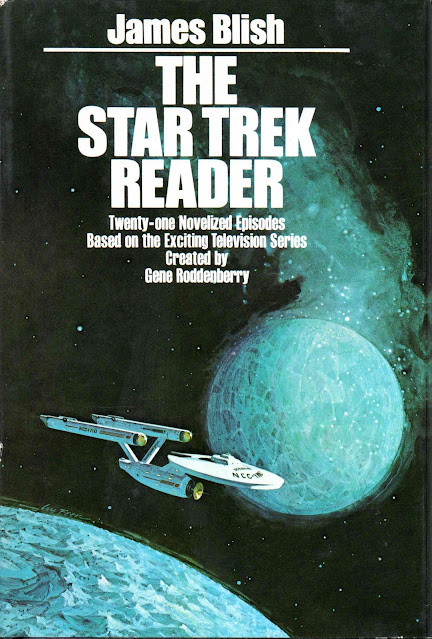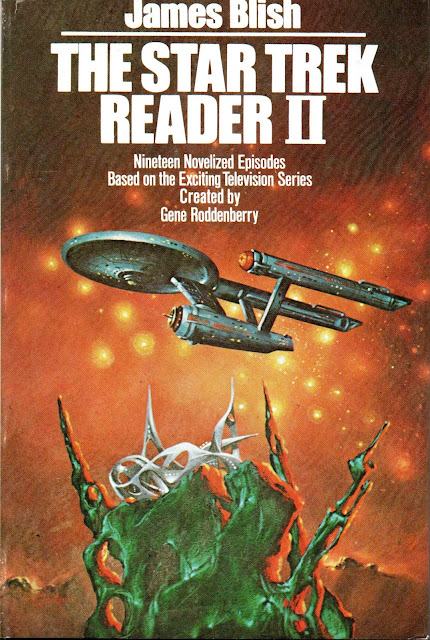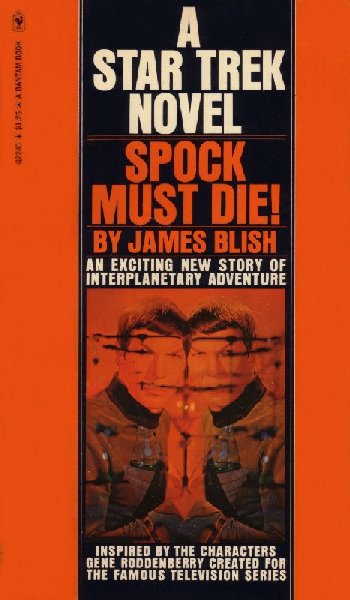In those archaic times before streaming, DVD, VHS, or even cable, when color was a new thing on the small tube which was in most people's homes in the late 60's getting hold of a permanent version of your favorite film thing was more difficult. One common way to do it was to convert the movie or TV show to printed form, it was not the ideal but it was a fascinating opportunity to hold the thing you loved in your two hands. And it offered in the best of cases an opportunity to witness variations on a theme.
James Blish was already an established science fiction writer when he was tapped to tranlate the scripts for Star Trek into short story form. There was exceedingly little merchandising associated with Star Trek in its earliest days and the paperback series from Bantam Books was among the best. Blish was a mature man when he got the gig, his reputation established by his remarkable Cities in Flight series and his novel A Case of Conscience which had garnered a Hugo Award. Blish was a member of early science fiction fandom and a member of The Futurian Science Fiction Society. Bantam tapped Blish to adapt the Star Trek series and he had a steady gig working these shows up until his death. His final few adaptations were unfinished by his wife J.A. Lawrence completed the work. Blish also contributed a new novel to the canon, Spock Must Die!, the second novel inspired by the series and the first to be directed toward an adult audience.
Reading these Star Trek stories is a different kind of pleasure than watching the episodes. The latter I've seen many times, but despite having purchased the stories collected in four omnibus editions from the Science Fiction Book Club decades ago, this is my first time reading all of the stories through. I have the series in paperback tucked away somewhere in the house, but it would be a task indeed to turn them up.
The characters as developed by Blish are a bit testier with one another than in the TV show. Spock's character in particular seems to have a somewhat different presentation, and we find his odd Vulcanite ways literally alienate him from the rest of the crew. There is though an animus towards him from Bones and Scotty not evident in the TV show. The friendly bickering between Bones and Spock is largely absent from these stories. Also we don't get so many sub-plots and that's often refreshing, making the narratives more focused and effective. Some of the same virtues which expressed themselves in the shorter animated series seem to operate in the short stories as well. One detail is that Blish takes steps to explain the myriad human-like races encountered by suggesting early colonization before the days of the Federation. It makes stories like "Miri" make a lot more sense.
The volumes I'm using are not complete. The twelfth and final volume is not included. But you can find those stories at the Internet Archive at this link. All of the paperbacks are here for your online enjoyment. These are stories for fans of the series and I don't for a moment suggest that these stories are substitutes for the Star Trek television show, but they are wonderful relics of bygone days when things were much more difficult to get.
After completing three of the collections, Blish was also hoping to take the two Harry Mudd stories from the series and create fresh material using that popular character. Spock Must Die! was published in 1970 and was of course in response the enormous popularity of Leonard Nimoy's TV creation. If one Spock was good, then two must be better. But that's not true when one of them is an evil twin. Let me add that I will likely be spoiling plot details as I discuss this fifty plus year old novel, so if you have plans to read it I recommend it but don't go much further.
The Enterprise finds itself of the other side of the universe when war between the Federation and the Klingon Empire breaks out. Peace had been kept according to the Organian Peace Treaty which derived from one of my favorite episode "An Errand of Mercy". Blish mentions the treaty a few times in his stories. He's careful to create a continuity between his stories, one which is not evident in the series itself. In order to find out what's up it's decided to use experimental techniques and the transporter to whisk Mr. Spock across distant space to Organia. The result is a duplicate Spock and much of the story deals with finding out which Spock is the original. Ultimately the evil Spock heads out to cause more trouble on Organia and Kirk and his team follow. They find the world behind a weird force screen set up by the Klingons. They ultimately defeat the false Spock and bring down the shield, leaving the Organians free to deal with duplicitous Klingons. Their decision is to confine the Klingons to their home world for one thousand years. So clearly this story cannot fit into anything of later Trek lore. But in the Blish-verse it seems that's the case.
I found Blish's original treatment of the characters fascinating to borrow a familiar phrase. He especially gives Bones a more intellectual approach and less of the pure emotion often seen on the show. Kirk is a leader just as on the show, but perhaps a wee bit more cold blooded. Spock seems about right, though perhaps more mysterious and it's often remarked that his cold demeanor is off putting to the crew. One thing which is odd about this story is the length of time it takes, which is months to unravel. Blish seems to treat space travel with a bit more respect as to time and size, remarking in a particular battle that the hardest thing about space war is finding the enemy in such a vast arena. This is a dandy read and highly recommended if you can find it. And as it turns out you can at this Internet Archive link.
This long visit with Star Trek this month and last has been a real treat. Time to move on to other things. Live long and prosper.
Rip Off



.jpg)




I knew someone who collected Man from UNCLE paperbacks and there were a lot of them. I wouldn't mind seeing a resurgence of print adaptations, though I guess they've just morphed away from paperbacks into more deluxe forms. Over the years I've seen quite a few great comics adaptations of film and TV subjects, going all the way back to Dell and up through the Marvel Movie Specials. One could argue that Disney comic books were no more than adaptations of animated cartoons.
ReplyDeleteOne of the weirder bits of trivia Mark Evanier discussed recently is that DC had the rights to produce a James Bond comic for ten years during the sixties, but never got around to it. The producers of the film were anxious to have a comic book in the US (reprinting the UK Classics Illustrated adaption) for the release of Dr. No and basically gave it to DC, and it ended up in a badly-timed issue of Showcase. Even after it was obvious to those who were paying attention that Bond was a massive cultural phenomenon, the DC geniuses didn't give it a second thought.
It's hard to explain the decisions DC made in the Silver Age. They were not in touch with their audiences as much as they imagined. Hermes Press reprinted the Avon Phantom novels a few years and they were quite handsome. I'm very happy to have them. There are lots of books like that out there.
Delete